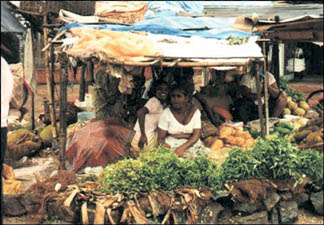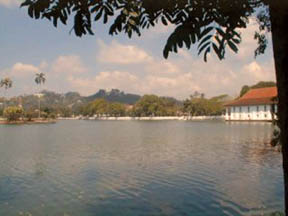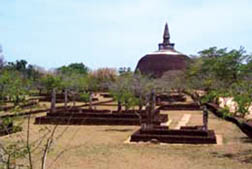|
observer |
|
|
|
|
|
OTHER LINKS |

|

|

|
Goviya's Looking GlassWe have survived as clans because we can remember what we were. Now, we can read all the signs around us by remembering the past. Nothing is new. Suba Saha Yasa, Milinda Prashna', Ummagga Jataka.... our folk stories - all this makes us wise. Nobody really fools us... we just pretend to be stupid.This is very safe in a society ruled by a dominant mentality. The boy, who thinks, usually ends up on tyres.
The water, the land, and the air....the elements we don't own. We therefore collectively plan all activity that affects one another. The only goal we aspire to is balance this brings the rain in time. When this balance is lost, we become denatured and our darker side manifests. The Deva-asura war is in our thoughts and our actions externalizes this war. Fear and Paranoia is a disease that affects all those who hold on to anything. In a culture where nothing is owned, there is nothing to fear. Fools have now arisen who react to the illusions around them. The demons and fears are in their own minds. Their urge to destroy themselves with their insecurity makes them take others with them. A shared vision of desire. The desire to rule, to dominate, to control, to make a lasting impression, to create history. Big tanksKolaamunuoya runs from Nathagane Pattini Devale to Karawita (sea). There were several 'gamas' and 'wewas' along this Oya. This was at a time when Gamanis ruled our 'gamas'. It was Pandukabhaya who first destroyed the tank system by building the mighty Pandawewa. Big tanks require a bureaucracy. Where big tanks went the Kingdom's power extended. In the small tank country our village was our world and the spirit that dwelt in our devale was both our God and King. Kingship, as an institution became a process whereby kings expand their control through water. Finally, with democracy, irrigation and roads came to the village and we lost control over everything. Very often the road went right through our tank. Rajakariya
Sri Lanka's agrarian culture was not based on the feudal patterns that existed in Europe. This interpretation was given to us by our foreign trained historians, sociologists and politicians. Our culture was based on Rajakariya not feudalism. To understand how this worked, one must first know what is 'yuthu-kama' duty. This was our contribution in keeping the balance. Our duty was not to a man - but to principle. It was principle that ruled not individuals. In keeping nature's balance, we knew what our responsibilities were. These responsibilities we consider a sacred duty. This duty was looked upon as a service to the community. There was no bureaucracy to order anyone everybody collectively attended to functions they were best suited for. Agriculture was the best example where all participated together for the common good. This was common sense. Social Scientists cannot understand this 'Mahasammata' (common consensus). They call it feudal based on the European experience that they have been taught. CasteThe book-trained rarely understand caste. For centuries, people have lived certain lifestyles. This is genetic information or 'Buddha Bhoga'. People are best doing what they like and understand. Every village had a distinct cultural pattern inside it. No two villages, are alike. In my mother's 'paramparawa' there is a 'Denapideni' custom, coming they say from Kuveni. In my father's 'paramparawa', there is something else. But my father and mother have the same 'ge' name, are from the same caste and come from adjoining villages As much as a tree is indigenous, to its environment, people are also indigenous to different environments. Village names arose from 'Rasa' - taste and, 'Guna' quality. My village is Thimbiri-yawewa, named after a Thimbiri Tree and a Wewa. This tree can live in and out of water. It is also a tasty wild fruit around which children gather. Similarly, every caste had its own secrets in maintaining the quality or 'guna' of the tribe. It is this knowledge that made them distinct. This 'guna dharma' ruled each group. Although this 'dharma' is now considered old fashioned primordial urges don't change. They surface in other ways. Village religionThe sun was our God King called 'Sooryadivyarajah'; The Moon was our God King called 'Chandradivyarajah'; the Earth was our Virgin Mother called 'Polo mahikanthava'. This was our religion. When the Sun and Moon united, we called it 'Palaviya', the night when there is no moon. We learned that out of darkness life begins in order to die. Life contained infinite possibilities with the cycle repeating itself endlessly with no beginning and no end. This is 'samsara'. The life cycle was understood by all with the Sun and the Moon as our teachers. Because there was nothing to worry, all were happy. It was into such a society that the city introduced Roads, Education, Churches, Business and Politics. Soon our simple 'gama pola' (village fair) had to compete with a 'mahapola' (great fair) and then with a 'jathika pola' (national fair). Naturally, our 'gama pola' lost out in this game. Poverty
Who defines poverty? Contentment can be found in a mud hut and misery in the palace. The family is the first unit. This is where our culture begins. For centuries we protected our children. Now those who came from broken homes, who have seen nothing but discontent, came to us as our saviours.... these agents of change were the real 'terrorists in our midst'. Poverty follows roads and new settlements. In traditional villages we consider ourselves rich, in fact we call the city 'Geri Wala' - the pit in which cattle is slaughtered. In the village we revere our cattle as our teachers. It was they who taught us about clay and mud. Every village lost its identity and individuality with its unique cultural pattern and became part of a nation when trade, commerce and money became the new Gods. Fertilizer, insecticide, tractors, miracle seeds; all this was a part of what the city called 'Rural Development'. A speed oriented urban mentality fast replaced our tranquil way of life. The simplicity of needs was replaced by unending acquisition and desire... what then is poverty? KingshipWe only knew what Kingship was. The individual associated with Kingship was of no consequence. The stability and goodness of a regime was determined by the rain coming in season bringing prosperity and peace. When there is conflict, division and drought, the people believed that the King was at fault. A rebellion followed since the King was unacceptable, and anarchy was the result. In order to survive, the King looks towards a division in the public mind and he tries to benefit from it. These attempts are recorded in history by scribes who live off the system. If the scribe is partial to the King, he becomes a hero and if he opposes the King, he is sent to jail. It is the same story always. We come to know of Kings only when they are mass murderers. Ashoka is the best example of this syndrome. Dharma warIn 1988 a poster appeared in Kataragama. It said that every secret will be revealed. This is what's happening now. 'Hora' (deceit), 'Boru' (lies) and 'Maayan' (illusion) will all be exposed. We are in the middle of 'Dharma' War'. Everybody and everything is under scrutiny. Nobody is exempt. This is the best era for Sri Lanka a golden era in fact, when people everywhere begin to understand how change comes by itself with the season. Till city people see the hand of nature in all what's happening around them, they will attribute blame to various people. How can we blame individuals? It is conditions, the system and 'irthu' (season) for all this to happen. Everything that happens happens right. HistoryAll written history is a story of conflict and war. Conflict appears in all cultures in between long periods of peace. Peace is hardly recorded in history. It is always a story of wars, of kings and of the building of monuments. This is what is taught to our children-conflict. Even today what we read in the mass media is the story of conflict where slander is the main weapon. Sustainability of cultures is based on practice, not on words. Without practice, theory is useless. Culture is forgotten and conflict emphasized and this nurtured and cultivated in the city. Unable to understand the truth we are being further taken into further chaos and division by 'poth karayas'. Do we barter our environment for the greed of a few or do we plan for our real needs? This question must be settled first. Foreign aid agencies influencing our people in choosing what's best is interference in our internal affairs. This 'New Industrialized Country versus 'Ecologically Sustainable Development' question is of utmost importance to all those who live in Lanka. Before any decision is made by a centralised government on what we do with our motherland, it must be a subject of an open debate. This problem is more important than as to what system of government prevails. IndustrializationThe industrialized world must protect South Asia from industrialization. It is in her interests to keep her 'green'. If South Asia were to follow the West, by the time the West wakes up, South Asia would have turned half the planet into one giant slum. Let's keep industry in the developed nations. They are used to that way of life. Let South-Asia retain its culture as an agrarian base. There is also money in this. We know that we are custodians not owners of the elements. How then can we pollute this region with politics, world trade and labour unions replacing a priesthood of farmers who venerated the land as a mother? ConsensusFirst the people must be told the truth. No one person should hold the reins with divide and rule as a principle. Individuals must disappear and consensus must rule. Only if the Sinhalese speak with one voice can we start a dialogue with the Tamils. If we are divided now can we insist that the Tamils be united? Already in every village tradition is getting stronger. People are going to temples and shrines and pleading with the gods for justice. In Jaffna, the people have got used to living without petrol, electricity or kerosene, but they are managing - why because of a cause they believe in. We don't have a cause that unites us, except perhaps capturing Jaffna. After that what? When we have destroyed most of Lanka what will we do with Jaffna? The youth are not stupid - after 44 - years if the present is the result, there must be something wrong with the system not with individuals. J.R. tried, Premadasa tried, but they have all failed that is why we have the present problem. How can anyone else succeed unless they understand the problem-the system? The FutureIn 1971, I opposed Wijeyweera's fifth lesson-armed conflict. I said that this was not necessary since the system will destroy itself. This is now happening. The electorate is fast losing its confidence in its leadership. A politician cannot walk on the streets without thugs and policemen guarding him. They are so busy slandering each other so that the whole country knows who the real criminals are. Parliament, the Presidency and the Law are all becoming irrelevant. The media is also suspect since it is also playing the middleman's role and it is a business. Where do we go from here? Anarchy. . . . but anarchy is not all bad, out of it will arise a new mind and a new era, devoid of hypocrisy and lies. Wijeyweera and Prabakaran are only symptoms. Destroying them will not solve the problem. ConflictTraditionally there was no Sinhala-Tamil divide. After the introduction of the 'Potha'-one in Sinhala, one in Tamil, people started fighting over what was in the 'Potha'. Even today the fight is over land. Land ownership starts with the Portuguese thombus, Dutch deeds and English law. Land grabbing is the cause of this conflict and lawyers have been the only regular beneficiaries. Instead of boundaries being watersheds and working towards common goals and ideals, we are now fighting over a land that is dying fast. Provincial boundaries were first 5, then 7, then 9. People were first asked to vote for colour, then a symbol and finally for a person. Division was bred and party politics was the method. JambudweepaTo us in the village, there is but one land mass. From Kailasa to Kataragama there was only Jambudweepa. This region was culturally related. For centuries pilgrims walked from North to South and although they spoke a thousand languages they were united by patterns of behaviour. This cultural pattern was destroyed by nations, boundaries and governments coming into being. Consider the story of Dharmashoka. Dharmashoka killed every small king. He became Emperor of Jambudweepa. Then he became a 'good man' and started preaching and sending missions abroad. Chanda Ashoka became Dharma Ashoka. This is what is in our history books - but the clever man sees through this story. The 'Mahawamsa' is a secret text - a labyrinth or a wanka-giri. Fools will fight over it and wise men will laugh over it. It is a story of Kings, bloodlines and Guna Dharma, not just a modern history book. ConstitutionsThese are also pothas. We villagers do not have any potha. Our culture is based on living 'sirit'. This has existed for centuries. This has been tried and tested hence its sustainability. The present constitution we are arguing about was decided in 17 days, experimented over 13 years and has 16 amendments. Why argue over this 'potha'? Why don't we realise that this 'Potha' is based on our ignorance and seek alternatives based on wisdom. What unites us is much greater than that which divides us. Let us first study what we have in common. If lawyers are to decide our future we can rest assured that we will only see division: that is their training. Co-existenceBats come to a tree with fruit. If you don't give, you don't get. A king must always be magnanimous. He cannot be bankrupt. He must understand people's love for novelty, for money, for change, for power, in fact for more of everything. These desires naturally lead to slander and competition. Everybody attacks each other. A false purity emerges. Leaders are mostly merchants. A villager fears the ocean. The wewa is the only ocean we know. Crossing an ocean is not our heritage. Traders, evangelists and reformers belong to another mentality. As long as they kept traveling, we had nothing to fear from them. When they settle down, they don't know how to use and protect the land. They are only used to harvesting and trading, not sowing and protecting. The KingA King has to be a murderer or how can he rule? In our villages there is an unseen King. He rules from behind a 'thira' (veil). All ritual functions associated with Kingship was carried out without the need for an individual King. With the rise of a city culture the unseen power was symbolised in the person of a King who played the role. His rule however could never be his personal whim and fancy. He was a servant of the Dharma. It was Dharma that ruled not the King. Every village had its own God-King. He resided by a wewa, in a tree, on a hill, a rock or in a cave. It was for this reason that the British encountered so many puppet kings in 1848. Who was in the palanquin did not matter. It was never the person only the idea. Nowadays, men want to be like gods. They trust in their own purity and wisdom. Instead of being like a pilgrim the modern ruler tries to be a missionary. He tries to impose his notion of Dharma on everybody. If he is not enlightened naturally there will be war. If he is enlightened, he will have nothing to fear because the Dharma will protect him. That is why there is a story that our king slept with a sword hanging over his heart. If he was just, he slept in peace. HumilityLampooning was part of our entertainment. 'Kolam' illustrated this best. Nobody and nothing was sacred. Today's media is a pale imitation. It is 'pandang karaya's' media. It only leads to false pride and belief in one's self importance. This is dangerous to both the rulers and the ruled. Everything becomes serious. Fun is removed and laughter prohibited. Why can't we laugh at ourselves? We are a culture that ridiculed even the King. This is best seen through ritual where we even use abuse to teach the King humility. What has happened to our sense of fun? The Lanka Guardian, Vol. 14 No. 17 & 18. |
 Fear and Paranoia results from feeling threatened. An ant called the
'Binkunda' teaches us this important lesson. It dances when threatened.
We therefore respect the right of every living being to seek happiness.
Our culture does not make us compete; we cooperate instead for common
ends.
Fear and Paranoia results from feeling threatened. An ant called the
'Binkunda' teaches us this important lesson. It dances when threatened.
We therefore respect the right of every living being to seek happiness.
Our culture does not make us compete; we cooperate instead for common
ends. 









